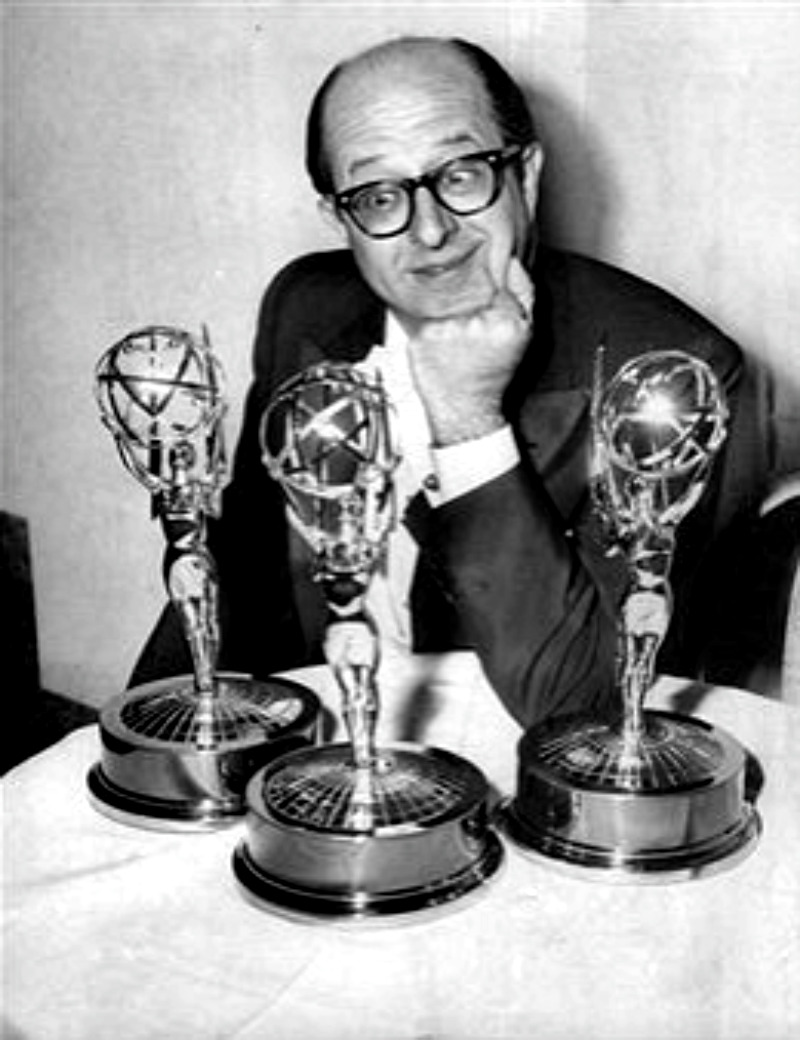Silverspeak!
Over the years Phil gave literally thousands of TV, radio and press interviews. Who better then to guide you through the life and times of Mr. Phil Silvers than the man himself along with the people who knew him.....
Some of the articles are reproduced in their original condition, whilst others have been recreated due to poor condition of the originals.
First up is an article from the THE DAILY EXPRESS (June 25th, 1982):

(Page 1)

(Page 2)
This next article was written by BOB GREENE and featured in the November 8th, 1985 edition of the US DAILY NEWS -

(Page 1)

(Page 2)
This next article comes from The DAILY EXPRESS (circa 1957)

This next article comes from a 1979 issue of TITBITS magazine -

The following article is an excerpt from an interview with Nanette Fabray published in IDOLS (UK) in 1986
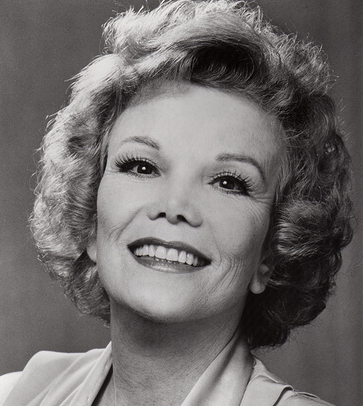
NANETTE FABRAY REMEMBERS PHIL SILVERS
Nanette Fabray remembers doing one of Silvers classics with him. “We did High Button Shoes which was one of Phil’s biggest hits. There was a very funny thing that happened when we were doing our dress rehearsal. Jerome Robbins had done the great Mac Sennett ballet which people are still copying today, with the Keystone Cops and gorillas and people in 1915 funny little bathing suits. The ballet was at the beach with a whole row of beach houses. The whole ballet was people running in and out of those swinging doors. The whole back of the stage and a backdrop with little bath houses painted on it, and the little doors actually worked. The whole ballet was everybody running in and out of those doors just missing each other. Well it was timed, as you can imagine, down to the microsecond. You would go in one door one way and somebody would come out when the door swang back the other way. In ballet you count – the first measure goes ONE,2,3,4 and the second measure goes TWO,2,3,4, - that’s how dancers keep track of where they are in the music. They don’t listen to the melody line they go by count, because they know that on TWO,2,3,4 they go through that door. So it was like a mathematical jigsaw puzzle.”
“Well Phil couldn’t count the way dancers count. Phil was counting 139,2,3,4 and he lost count. Gradually it was becoming like a Rube Goldberg cartoon, like dominoes. Phil missed going through one door and knocked down somebody down who then fell and knocked somebody else down. By the end of the number in our dress rehearsal I would say that 90 per cent of the cast had sprained ankles, bleeding lips and bangs on their necks. A couple of people were out cold on the stage. The only one who was running around still whole was Phil Silvers!"
"At the end of the number, George Abbott, who was the director, came up on the stage and said to him “Phil that wasn’t funny.” Of course Phil didn’t mean it to be funny. It was lucky nobody got killed! They finally took all the people except the dancers out of that number because nobody ever knew what Phil was gonna do, how he was gonna get through those doors. The number was a great smash hit, stopped the show cold, but there you could here Phil counting out loud at the top of his lungs. He had no clue as to where he was in the stage, running in and out of doors!”
“Phil invented something that was quite wonderful once.” Fabray continues. “He went to see somebody’s movie at a preview, and it was just awful, a terrible movie. It was one of the first Technicolor movies that had come out, and it was a big, showy show. As we were going up the aisle we were all trying to think what to say to this person when we got out the door. He was gonna be there waiting to hear what our opinion was. When we got to the door, Phil turned round and said “I’ve gotta tell you, that is a colourful movie!”. And the producer accepted it as a compliment, which of course it wasn’t – it was a way of avoiding the subject. He invented what has become a cliché in our business – “It’s a colourful movie.”
Of Phil himself, Nanette Fabray had this to say, “Phil was an incredibly fun person to be with. He was the kind of guy that the minute he walked in the room things became fun!”
In this 1957 article, Phil recounts one of his favourite funny stories...
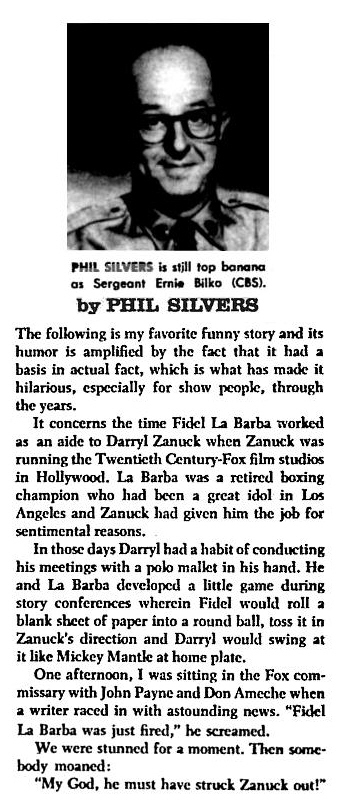
In the article below, first printed in March 1963, Maurice Gosfield talks about The Thrill Of It All (1963)

Two More articles of interest below - the first shows the TV debut of The Phil Silvers Show on September 20th, 1955 - the second is a TV listing from 1971 for Bel Air Patrol (aka Eddie) a pilot Phil shot in 1967 which didn't make it to series....

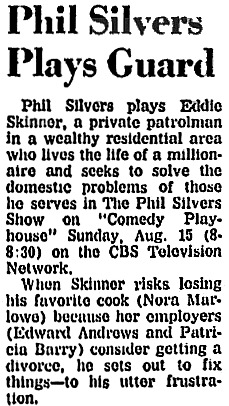
Below - Article detailing Phil's obituary from November 1985
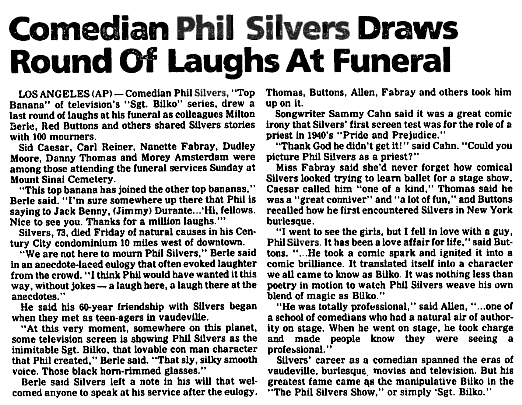
Below - Articles featuring details of Phil's voice-over for the Nelvana animation feature Take Me Up To The Ballgame (1980) and an interesting piece on the pairing of Cathy Silvers and Michael Lembeck in Foley Square (1984)
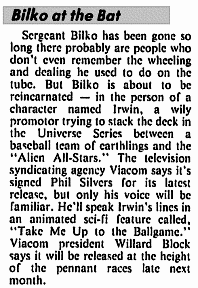
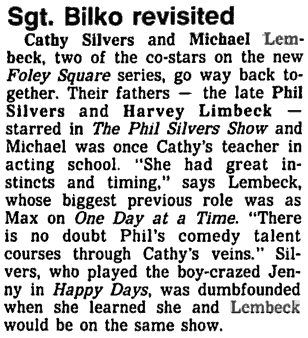

Above: DAILY MAIL article from November 8, 1985

Above: DAILY MIRROR article from November 1983
The following article was written by journalist Robert Chalmers in 1996.
|
Phil Silvers won the battles with 'Sgt.Bilko' - but lost the war with himself!
Phil Silvers' daughter Nancey and I met in the lounge of he Beverly Hills Hotel, Silvers' old lunch venue of choice. A few days later the tenth anniversary of his death would pass uncommemorated on either side of the Atlantic. His greatest creation, the role of Sgt. Bilko in The Phil Silvers Show, had not been screened on a U.S. public network for 25 years. In his own country, popular awareness of Silvers has faded sufficiently for Steve Martin to recreat the part in the film Sgt. Bilko, in the well-founded expectation that many viewers would be unaware of the character's history.
Silvers' daughter showed me a handful of black and white stills from the first Bilko series, each dominated by the larcenous sergeant whose inner vulnerability is symbolised by the glasses he never removes.
Phil Silvers found his magnificent voice in scripts by the show's creator, Nat Hiken, and other writers such as Neil Simon; for its brief life, between 1955 and 1959, The Phil Silvers Show achieved a level of sustained inspiration that has never been bettered in television comedy.
Silvers revelled in the brazen implausability of his lines: whether visiting a medium ("There are no lights on - she must be in") or flattering a local cook with a view to stealing his secret recipe ("All my life I've eaten in the finest restaurants in the world. I thought I was eating. I realise now I was merely grazing, like an animal"). |
 |
|
Phil Silvers was born in Brooklyn in 1911, the eighth child Above: Phil Silvers as Sgt. Bilko, left, marched to a different drummer; of Russian immigrants. At 12 he was touring in Vaudeville. sidekicks Harvey Lembeck and Allan Melvin try to keep up with his money-making schemes in The Phil Silvers Show A precocious star on Broadway, he moved to Hollywood before he was 30, but it was some time before he was cast. From the start, Silvers' off-screen interests -- the racetrack, the ball park and the pinochle table -- were paramount. The gambling had begun at school; by the time he was 15, Silvers was regularly hailed by the voice that tormented Sgt. Bilko.
"I hear money," Bilko tells his men. "Our money. Crying out into the night. 'Daddy...take us home'."
Unemployed, Phil Silvers became a popular MC for parties hosted by friends such as Gene Kelly and Frank Sinatra, and acquired a reputation for his brilliant improvisations as a songwriter and comic. Gradually he began to get parts in musicals like Coney Island and Diamond Horseshoe.
"He never talked about his feelings," says Jo-Carroll Dennison, a former Miss America, who became Silvers' first wife in 1945. "Big men don't. But he used to get terribly cotton-mouthed before he went on. It made me nervous to watch him. There was never enough applause. There was never enough laughter." |
|
Above: Phil Silvers contemplates a host of Emmy Awards. The Phil Silvers Show won a total of 8 Emmy Awards in 1956, including Best Comedy Series, Best Writing and Best Actor - Continuing Performance. |
Marriage, somebody once said, can cause trouble for a gambler. In the late 1940's, Silvers was making $5,500 a week; a sum which, the actor later admitted, "slipped into the bookies hands as if it was magentized."
After five years, Dennison called it quits. "When we got divorced, he'd lost it all," she told me. "We never lived expensively, or travelled, because he gambled everything away."
Contemporaries recalled Phil Silvers offering them bets on the weather, the make of the next car round the corner and the orders of fellow diners in a restaurant.
"If he won," one friend told me, "he would show no exhiliration. Other times I saw him drop $30,000 in a half-hour period, and he would let out this deep sigh, almost of satisfaction."
When Silvers lost, agrees Mickey Freeman, who played Zimmerman in Bilko, "it was like an orgasm. He was a bad winner. losing was his thing. And God knows, he lost."
Silvers, who rarely drank and was never a womaniser, found that his income from the movies and Broadway productions such as Top Banana -- the 1952 musical which won him every award in the American theatre -- allowed him to indulge in his favourite pastime without ever incurring total ruin.
Silvers was initially unenthusiastic when summoned by Nat Hiken to discuss a new television series to be broadcast in 1955. They talked for hours in Hiken's Manhattan office, and developed a character based on Silvers' own instincts, notably a fundamental compassion masked by a pathological craving for action.
"Hiken understood Phil Silvers/Bilko so well," says Freddie Fields, "that it was almost a collaborative efort by silence."
The motor pool sergeant was, Silvers believed, "the reincarnation of all my previous lives. I was predestined to be Bilko." |
|
The shows, filmed in front of a live audience and interrupted only by scene changes or catastrophe, were frequently enlivened by Silvers' genius for improvisation. In The Court Martial, a chimpanzee is accidentaly inducted into the motor pool. Silvers was defending the animal at its army trial when, to the horror of the cast, the accused climbed down from the stand, loped across the set and lifted the receiver of a telephone on a nearby table.
"Sir, I request an adjournment," Silvers said, "My client is calling for another attorney."
"Before Bilko," says Neil Simon, "Phil had never been allowed to take the ball and run with it. He added lines himself, and he took a great deal of interest in all of the writers. He told me, 'One day you are going to write good plays. That is where you belong: in the theatre."
A month after the Bilko premiere, Silvers, who said he had "an affinity for beauty contest winners", met his second wife Evelyn, a "Revlon Girl" and former Miss Florida. They had five daughters (including Nancey, a successful screenwriter, and Cathy, who starred in Happy Days and appears in Steve Martin's Sgt. Bilko).
When CBS abruptly cancelled the series, apparently fearing that its continuing success might harm future syndication fees, Silvers, according to one former colleague, was "in shock".
The New Phil Silvers Show, which was essentially Bilko set in a factory, was pulled off after nine months, in 1963. Shortly afterwards, Silvers, whose bachelor instincts and morbid introspection were making him increasingly difficult to live with, split up with his wife.
By the mid-1960's, the actor, by now acquainted with most antidepressant medications available, was complaining of being "frightened to be alone" and was "so jittery I can't sit down." He checked into the Cedars-Sinai hospital.
His doctors urged him to work. Leo De Lyon, Silvers' piano accompanist and close friend for 30 years, recalls their joint appearance on The Jackie Gleason Show after Silvers emerged for a 1968 hospital stay.
At the rehearsal, Leo recalled, "Silvers was magnificent. Now comes the show. The ovation Phil got was beyond description. I watched his body. And as the applause ran on, I saw him tensing up. When he did the performance, it was like a trained robot. I could see him trembling. When he came off, he wept and he said: 'I can't do this, I can't even do this.'"
In 1972, he returned to Broadway in A Funny Thing Happened On The Way To The Forum. The reviews were the best for any musical since My Fair Lady; suddenly, seven years after his depresssion began, the actor announced that what he had come to call his "lead collar" had been lifted.
"Phil Silvers," said the New York Times, "is a national treasure."
It was, Silvers said, the greatest year of his life. When he was nominated for best actor in a musical, he claimed, "I knew I would win. This is no conceit. I just knew."
Then, one July morning in Delmonico's Hotel, he suffered a stroke which paralysed one of his vocal chords. He temporarily lost control of his arms and legs. Forum closed immediately.
The following year, still partially paralysed, he returned to the stage, in England, with a touring production of Forum which went extremely well. Once back in the States, however, work was intermittent.
"When he was depressed," says Freddie Fields, "we would sit and talk for hours. He kept saying: 'Is it over? Is it over?' and I would say 'No Phil. It's not over.'"
He continued to see Evelyn and the children every Sunday, and kept in touch with his first wife by telephone. By the early 1980's, Jo-Carroll Dennison recalls, "He just closed himself off. Often he would just stay up in his apartment in the dark, as he told me. It wasn't the least bit funny any more."
Leo De Lyon carried on visiting wether Silvers wanted to see him or not.
"Many people just deserted him," he recalled. "In Hollywood, if a person has leukemia or AIDS, they gather round and empathise. But when an emotional disorder shows up, they panic. Once, when I was going to see him, one of his famous friends came up and said, 'Well -- have you seen our friend lately? Does he cry on your shoulder a little bit?'. That kind of stuff."
Some people said Silvers might have been happier if the Bilko show had continued.
"I'm not so sure of that," said Mickey Freeman. "I don't think happiness was in Phil's script."
(Robert Chalmers - The Detroit News (1996)
The following article comes from the April 15th, 1957 edition of the New York Post |
|
MIDTOWN, N.Y. - By Robert Williams |
|
Karol Lukasiak mans the change booth in the 15 St.-Prospect Park Station of the IND in Brooklyn from midnight to 8 a.m., five nights a week.
The nights are long and usually without incident except for an occasional drunk, who cannot see from outside the booth how big and rugged Lukasiak is and tries to pick a fight with him.
Once, Lukasiak had to lock up his booth and race out to the tracks to rescue a would-be suicide from an oncoming train.
Another time he made a quick phone-call to the police, tipping them off that a man was brandishing a revolver on a train.
On neither occasion did he get his name in the newspapers, because the would-be suicide lived to die another day and the gunman was captured by the cops without incident.
At the end of his shift at 8 a.m., Lukasiak usually walks the nearby Catholic church and attends mass before going home to his apartment on 12 St., and to bed.
Of sleep, there is little in his life. Three or four hours a day at the most. Sometimes less. For at approximately noon, Karol Lukasiak must become Karl Lukas |
|
|
|
Karl Lukas is an actor. On most Tuesday nights he may be seen on The PHIL SILVERS TV Show as "Pvt. Kadowski", a member of Sgt. Bilko's squad. This involves rehearsals Monday, Tuesday and Wednesday afternoons, plus filming sessions Thursday and Friday.
By 5.30 p.m., usually, Lukas is on his way back to 12th St., where he has time to dine with his wife, Stephanie, before going out on his night job.
His night job is at the off-Broadway Rooftop Theatre on Houston St., where he is currently appearing in 'Volpone'.
The director generously permits him to skip the nightly curtain call so he can gohome, eat a snack and dash back to the change booth at midnight to do Lukasiak's job.
"You see," the actor-transit worker said, "Lukasiak really wanted a steady job, but Lukas wanted to be an actor. So they compromised. They agreed to cut out sleeping. The question is, who will give out first?."
It is his considered opinion that an actor must have some other basic occupational identity. "If he doesn't," he said, "he's like a dog looking for a bone."
Not that Lukas hasn't had his share!
Since coming here from Lowell, Mass, in 1937, he has worked in a bakery, in a steel mill and done a Navy hitch. But he has also held down roles in 'Mr Roberts' and 'Remains To Be Seen' on Broadway, as well as on just about every major TV show from 'Studio One' to 'Captain Video'.
Once he went to Hollywood and tested for the Willie role in 'Up Front' but lost it to Tom Ewell. The screen test so impressed director George Stevens that he wanted to cast Lukas as 'Killer Jack Wilson' in 'Shane'.
Lukas was already under contract for 'Remains To Be Seen', so the part went to Jack Palance and made him a star.
For Lukas, 'Remains To Be Seen' lasted six months. But Lukas did do a role in the Lucille Ball-Desi Arnaz film 'The Long, Long Trailer', which remains his sole major screen credit.
"Sure, as it turned out, I could have lived on my earnings as an actor," he said. "But it's a game of craps. It can be feast or famine. The subway joob eliminates the famine and it never conflicts with a possible acting job."
It happened a few days ago that Lukas was summoned to Investigating Commissioner Tenney's office for questioning. It seemed his carhad been parked recently in the vicinity of Chateau Gardens on the Lower East Side, where the Communist Party was holding its national convention.
A city cop jotted down the license and it checked out against the name of a subway employee, Lukasiak. So Lukasiak was called in to explain that he had parked his car there only so he could get to work at the nearby Rooftop Theatre. Which necessitated is revealing his alias, Karl Lukas.
"They were a little suspicious, at first," he said, "but I convinced them I only lead two lives!"
|
|
(Above) Press cutting from 1962 |

